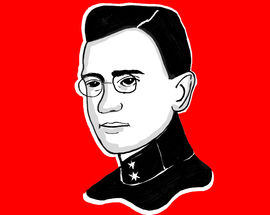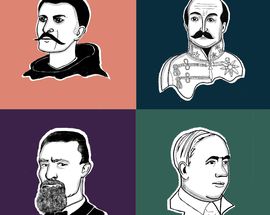The Father of Modern Astronautics
There seems to be a fairly grizzly recurring theme with these Great Slovenes. France Prešeren died aged 49. His great influence, Matija Čop, drowned only 38. Poetic geniuses Karel Destovnik and France Balantič (more on them shortly) were a youthful 22 and 21 respectively. Not wanting to be left out of this list of the youthful dead, the man known as the father of modern day astronautics passed away at the depressingly young age of 36. Much like the others he also died penniless and alone. He was practically unrecognised during his lifetime, but his reputation and influence has grown considerably in the years since his death. His name was Herman Potočnik.Born in the lovely Istrian town of Pula (Croatia) to a staunchly Slovene family, Herman Potočnik entered this world on December 22, 1892. His father, a high ranking navy officer in the Austro-Hungarian navy and a doctor, passed away when Herman was only two, so the family upped sticks and moved back to Slovenia. The family headed first to the village of Vitanje before moving on to Slovenia's second largest city, Maribor. It was in Maribor that young Herman went to high school, before going on to a number of military secondary schools in Czechoslovakia. His mama was a descendent of Czech immigrants as well as the daughter of a well-known wine merchant, and lil’ Herman found the transition to Czech life not too difficult at all. His uncle Heinrich was also a major-general in the army at the time, so Potočnik's connections were plenty. Between 1910 and 1913 he went to study at a technical military academy near Vienna, where he graduated as an engineers second lieutenant specialising in the building of railways and bridges.
It was in this very same area that he would find himself scrapping it out during World War One. Herman served in Galicia as well as Serbia and Bosnia, and was one of the finest bridge and railway construction experts on the scene. He was eventually assigned to the South-Western Soča front, before being pensioned off in 1919 because he contracted tuberculosis. This might not sound so hot, but then you must remember that the vast majority of people involved in World War One got pensioned off because they contracted bullets to the face and torso. A bit of ol' TB ain't so bad. Actually, it's usually a bit of a drawn out death, so maybe the bullet would be the better way out. Either way, war is silly and wrong.
Following his military retirement he went back into academics, studying electrical engineering in Vienna. It was whilst studying in the Austrian capital that Herman finally found his niche, his speciality. What was it, I hear you cry? Rockets. Is there anything cooler than rockets? From 1925 onwards this interest slowly evolved from a curiosity, into a passion, into a full-blown obsession, and Herman became completely devoted to rocket science and the question of space. He was always ill, he never had any money, he never really had a job and he certainly never married. He spent most of his post-military retirement living with his brother in Vienna. Despite all this, he left an indelible mark on the world. Or, more precisely, the world outside of our own. It quite literally was rocket science, and if you think that is the last time I’ll use that joke in this chapter you haven’t been paying very much attention so far.
Herman Potočnik, now going by the pseudonym Herman Noordung, published only one book. The reasoning behind the pseudonym was never revealed, but most believe it's a play on words of the German word 'ordnung', which means order. The 'N' at the beginning could be to act as a negation, so his pen-name was something along the lines of 'no order'. Maybe. Who really knows.
Anyway, Hermie only published a single book, but what a book it was. Entitled 'Das Problem der Befahrung des Weltraums: der Raketen Motor' ('The Problem of Space Travel: The Rocket Motor'), this 188-page book planned a permanent human presence in space, including the detailed design of a space station that would orbit the earth. It was the first example of space architecture, and would be the groundwork for the eventual exploration of space. The 100 detailed illustrations in the book showed wild imagination coupled with concise science. Being such a far flung idea he was only really taken seriously by amateur German rocketry folk, because those guys will take anything seriously, and the Viennese engineers described his plans as pure fantasy, and whilst it may well have been fantasy, it eventually became reality and changed how we view our own world.
His book delved deep into finding a way to overcome gravity, that pesky old mite, an idea way ahead of its time. Herman also looked at ways of using space technology in every day life, all the while warning against its misuse for military purposes. Potočnik envisioned the geostationary satellite that would eventually orbit the globe. This was space travel as a real possibility, not just the day-dreaming of a poor and unwell engineer. He made it a scientific possibility. Sure, there probably was a decent amount of daydreaming too, but the proof is in the pudding, which in this case is written on paper.
Herman Potočnik truly had an extraordinary technological imagination. Similar to Nikola Tesla (albeit minus the weird love for pigeons and all the eugenics stuff) he conceived future technology way ahead of its time, and was met with giggles and derision. His influence would grow after his death, and his book and plans were instrumental in the work of Wernher von Braun, the first director of NASA, a man who described Potočnik as the 'catalyst' for space technology. His idea for a space station would directly influence Stanley Kubrick in the film '2001: A Space Odyssey'. Herman Potočnik is as influential as any character in the history of space science, which isn’t so bad for an ailing dude from Pula. Some have even claimed that the US bought secret Potočnik plans from Yugoslavia and used the information to go to the moon, but some are also mad.
Still, this probably mattered little to ol' Potočnik, as he died miserable and poor in Vienna at the age of 36. His lungs would eventually contribute to his doing in, as pneumonia took it upon itself to deprive Potočnik of the capability of living. Much like Prešeren, Potočnik's life certainly could not be described as a happy one, but the mark he left can't be denied. Good job he evaded those damn World War bullets.
Just a reminder: the preceding was an excerpt from the book, An Illustrated History of Slavic Misery: The good and the great of Slavic history, dusted off and celebrated, which you can read more about here and here, and buy online here.









Comments